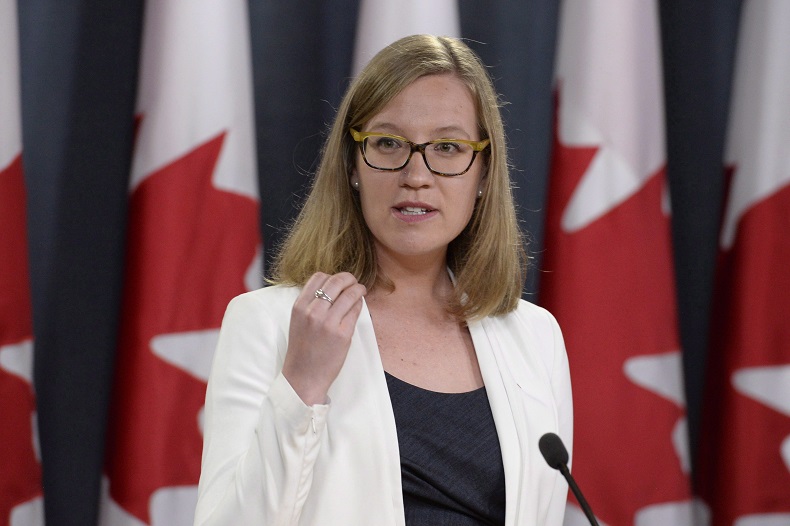If you don’t use the internet the way Justin Trudeau wants you to, you might just be fake news.

While “fake news” has become a rather ubiquitous punchline, the spread of it on social media has apparently become a priority for Canada’s Liberal government.
Just a few weeks after the Toronto Star reported that Trudeau threatened digital companies with regulation if they don’t curb fake news, Canada’s minister of democratic institutions has weighed in. In an interview with CBC, Karina Gould said companies have until the summer to get their acts together.
“My hope is that over the course of the spring that we have some more in-depth conversations with social media companies. We’ll have to see where those go and how we think they’re progressing,” she said. “If we don’t see something more robust in the next six months, then we need to take action.”
What action, she didn’t say. But even expecting digital giants to play along with this absurd exercise is government injecting itself where it doesn’t belong. There’s no place for the state in the Twitter accounts of the nation, one might say.
Gould didn’t say (and likely doesn’t know) what government is even capable of doing in this space. She did say that she feels “very uneasy with a government telling people what’s good and bad news,” in response to a proposal by the French government to ban publication of fake news.

WATCH ABOVE: Our people spending less time on facebook?

Get daily National news
At the same time, however, she called Germany’s approach — which involves threatening companies with hate speech laws — an “interesting” one. As we know, Germany has always excelled at striking a balance between government pressure and citizens’ rights.
I hope Gould’s inability to come up with a concrete solution to what her government sees as a growing threat ends the discussion, because this is one for media companies — social and traditional — and their users to sort out.
Those in the dot-com sector must protect the integrity of their platforms. So far, they’re failing. But the desire to let truth reign supreme by stopping the spread of misleading, or downright false, information, raises other concerns.
- High blood pressure drug recalled over low blood pressure pill mix-up
- ‘Doesn’t make sense’: Union files labour complaint over federal 4-day in-office mandate
- Ottawa gives Canada Post a $1.01-billion loan amid ongoing financial struggles
- Ontario Liberals announce date to select new leader, kicking off race
True and false may be black and white values, but “fake news” lacks a cohesive definition.
Are the Onion and its Christian counterpart the Babylon Bee — publishers of clever, poignant satire — fake news? How about biased, but fact-based publications like Press Progress on the left, and Canada Free Press on the right?
It’s disingenuous to put any of these in the same category as fly-by-night sites like EaglePatriotLiberty1776PaulRevere.com or RightWingersAreRacist.kkk.
This false equivalence was on display in a viral “False, misleading, clickbait-y and satirical ‘news sources'” Google Doc published last November by a Massachusetts communications professor. In it, legitimate conservative outlets like the Washington Examiner and Daily Caller were deemed “unreliable” while the unabashedly left-wing Huffington Post and Buzzfeed didn’t appear at all.
Can Justin Trudeau, or any politician for that matter, be trusted to discern what media are worthy of consumption?
Environment Minister Catherine McKenna tweeted last week that an opinion column she disliked, by the Toronto Sun’s Candice Malcolm, was “fake news.”
When a cabinet minister labels a critic “fake news” in the same month a colleague threatens companies that allow fake news, Canadians should be concerned.
How can the government regulate what it so woefully misrepresents?
Social media was supposed to be society’s great equalizer. No longer is speech limited to those with a corporate or state backing — everyone has a voice. Unsurprisingly, not every voice is worth hearing. But that’s the price of free speech. And it’s worth it.
I fail to see why government thinks it can do a better job at sanitizing the discussion than I can by simply clicking the “mute” button.
But the belief that Canada — which isn’t even in the top 10 countries when it comes to Facebook usage — can influence companies to solve this problem is a delusion of adequacy on the part of Trudeau. The government can make all the requests it wants, but Canada’s clout is limited.
If companies don’t comply, the government’s options are fairly limited: it could go after users who post items afoul of government policy or law; it could block access to sites, putting Canada on par with dictatorships like North Korea and China; or it could withhold advertising dollars from these companies.
Much as Trudeau may fancy China’s “basic dictatorship,” I hope imitation isn’t his form of flattery.
I wouldn’t mind the government axing its $7 million social media advertising budget for fiscal reasons alone, but it’s a dangerous game for government to start picking and choosing where to spend its money based on editorial bias.
Pretty soon, the only home for government propaganda will be The Toronto Star (and no, I’m not talking about the editorials.)
Misinformation may be a problem, but anyone who believes politicians can be the arbiters of truth is, themselves, a believer in fake news.
Andrew Lawton is host of The Andrew Lawton Show on Global News Radio 980 CFPL in London and a commentator for Global News.












Comments